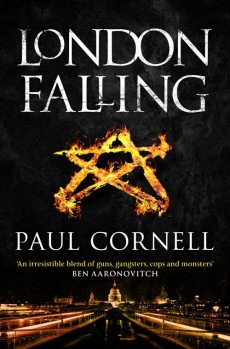I’d heard many good things about London Falling, and had always liked Paul Cornell’s work on Doctor Who, so it was with some degree of anticipation that I added this book to my reading list.
Tag: books
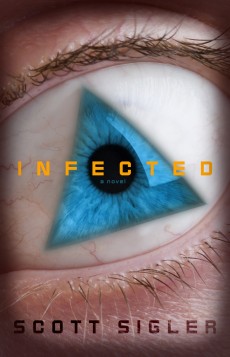
I continued my bid to become a ‘real’ reader again with this visceral sci-fi chiller from Scott Sigler – a sort of Invasion Of The Body Snatchers, but with blood and guts turned up to 11.
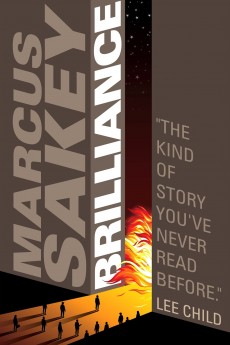
In the ongoing saga of my bid to develop a healthy reading habit, I moved straight from The Girl With All The Gifts to Brilliance, a sort of science-fictiony, crimey-wimey novel by Marcus Sakey.
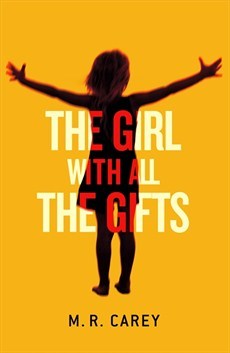
One of the things I’ve been meaning to do with this blog is write more reviews. I’ve read a handful of great books over the last few years, all of which deserved to have some written in their praise, but I typically ended up leaving it too late; to the point where all I could really recall was “Oh, I really liked that book!” In an effort to avoid making that same mistake this year, here’s a few words about a book I finished the other day.
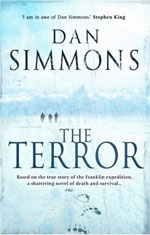 Dan Simmon’s latest novel was recommended to me by a friend. He piqued my interested by making it sound a bit like The Thing, but with an historical setting. In the end it took me several months to actually track down a copy at my local library, but the book proved worthy of the added anticipation.
Dan Simmon’s latest novel was recommended to me by a friend. He piqued my interested by making it sound a bit like The Thing, but with an historical setting. In the end it took me several months to actually track down a copy at my local library, but the book proved worthy of the added anticipation.
I’ve not read any of Simmons’ previous works, so I had little in the way of expectations – other than the vague idea that, with its Thing-like subject matter, it might be an enjoyable, but pulpy horror yarn. As it turns out The Terror is an absorbing historical thriller with a supernatural subplot expertly weaved throughout.
The first page initially deterred me, mainly due to Simmons’ fondness for epic length sentences that keep you waiting for that mental drawing of breath. Perhaps this is a cunning writer’s trick. Anyhow, by the second page I was fully immersed and all complaints over literary construction were quickly forgiven.
Based on what must have some exhaustive research (I believe, among other efforts, Simmons actually travelled to the Arctic) The Terror paints an astonishingly detailed portrait of life for the crew of HMS Terror and HMS Erebus, trapped in the Arctic as a result John Franklin’s ill-fated 1845 expedition to conquer the Northwest Passage. There are a number of historical novels that vividly describe life at sea, but Dan Simmons places the reader so close to his subject that you’ll want to wrap up warm before delving into The Terror.
Those familiar with the story of the Franklin Expedition will know that much remains unexplained, particularly the exact nature of the ultimate fate that befell the twin crews. Of course where facts remain oblique there’s ample room for conspiracy theorists and novelists to fill in the blanks. While there’s no doubt that much of The Terror should be viewed as fiction (as intended), there’s a solid framework of fact welded to a secondary tale of an unstoppable, terrifying beast that picks off the unfortunate sailors at regular intervals.
While far from essential, a little reading up on the Franklin Expedition makes The Terror all the more enjoyable. Certain facts, discoveries made after the event, and biographies of key characters are made an integral part of the fictional story – integrated so skilfully in fact that you’ll find yourself convinced that Simmons’ version of events is entirely plausible.
However, detailed historical research and elaborate plot construction clearly isn’t enough to keep Simmons off the streets as an impressive dose of Inuit folklore and mythology is also factored in. This plays a significant role towards later chapters of the novel, but is well enough integrated that the shift from deep history to supernatural horror to mysticism doesn’t jar.
Although The Terror, by virtue of its Arctic setting, is doomed to be forever compared to The Thing, it should be stressed that it is leagues away from being a clone of that other great icebound chiller. It is a stunning novel that might deter casual readers simply due to its depth and wealth of detail, but will forever reward those bold enough to embark on this rendition of the Franklin Expedition.
Just remember: it’s not called The Terror for nothing.
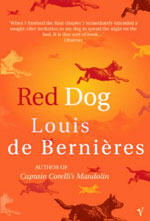 Ordinarily I would never pick up a book by Louis de Bernieres. For one thing he has a pretentious name, although that may well not be his fault. For another I hated the film of Captain Corelli’s Mandolin. Again, not his fault. Nevertheless, these things work against his favour. (I think I may have once attempted to read the book of Captain Corelli’s Mandolin, but since I neither remember finishing Captain Corelli’s Mandolin, nor am I even sure that I even started it in the first place, I have to assume it was an unhappy experience, if indeed it was an experience that took place at all).
Ordinarily I would never pick up a book by Louis de Bernieres. For one thing he has a pretentious name, although that may well not be his fault. For another I hated the film of Captain Corelli’s Mandolin. Again, not his fault. Nevertheless, these things work against his favour. (I think I may have once attempted to read the book of Captain Corelli’s Mandolin, but since I neither remember finishing Captain Corelli’s Mandolin, nor am I even sure that I even started it in the first place, I have to assume it was an unhappy experience, if indeed it was an experience that took place at all).
I stumbled across Red Dog while attempting to find out if there were any worthy Australian novels to read. Either there are very few (published) authors in Australia or the books simply don’t travel well, because I didn’t find a great deal.
One thing I did find was Red Dog, which isn’t an Australian novel in the strictest sent, but it does take place in Australia. It’s based on the true story of a dog called Red who travelled his way around Western Australia, adopting different owners at different times, and generally seemed to be liked by most of the people whose paths he crossed.
It’s a slender book, and written with an appealing simple style which makes it great for kids, but rewarding for adults (bit like a Pixar film). Consequently it’s a very short read, but one that’ll probably stick in your mind for quite some time.
Next time we’re in Australia we’ll try and get a picture of the Red Dog memorial, the one that first inspired De Bernieres to write the book, and post it to the moblog.
I’d avoided reading The Beach for years, irrationally dismissing it as pretentious tosh for the middle classes. This opinion was partly derived from the fact that everyone seemed to be raving about it as soon as it was published – usually something that will consistently get my back up. Also, it seemed to me that the sort of people were raving about were pretentious middle classers, and other irritating people who would inevitably lay claim to the book with? lines such as ?Oh, I can SO relate to that??
Of course, I was wrong about all of this – aside from the pretentious middle classers, they’re all still out there and as annoying as ever.
I saw the movie of The Beach on TV a few years back and found it interesting enough to pick up a second-hand copy of the book. I’m always keen to see how a book evolves from page to screen and will often read books of films I’ve enjoyed (not novelizations, please – though The Abyss was quite good). This enthusiasm to directly tap into the literary source of the film resulted in the book sitting on my shelf for the next couple of years until finally I decided it was time to read it. Maybe I just wanted to leave enough time for the film to fade from memory.
The first surprise for me was that while Alex Garland is a capable writer, he’s not a great one. I found this strangely comforting. During my period of Beachy-abstinence I had generally assumed that it was a dense, literary novel, and one that was probably prone to passages of magic realism. Like most people, dense, literary novels leave me feeling daunted and inadequate as if my puny brain isn?t up to the meagre task of reading words.
Fortunately this wasn’t the case. The Beach is eminently accessible, even if you haven’t been to Thailand – and neither does it rub your nose in the fact that you haven?t been to Thailand. Garland also makes the central character, who is a bit of a twat really, come across as fairly sympathetic, which is no mean feat.
In general a satisfying read, but I sense that Garland may be one of those writers who just has one good book in him. I can’t say I feel the urge to pick up The Tesseract or The Coma just yet.
Come to think of it The Coma sounds quite interesting…
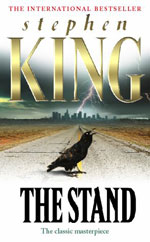 I just finished reading The Stand again for what must have been the third or fourth time. It’s always been one of my favourite books, but I think I enjoyed it even more this last time – this is despite having recently watched the TV adaptation (which prompted me to reread in the first place) and consequently having fairly good idea of what was going to happen.
I just finished reading The Stand again for what must have been the third or fourth time. It’s always been one of my favourite books, but I think I enjoyed it even more this last time – this is despite having recently watched the TV adaptation (which prompted me to reread in the first place) and consequently having fairly good idea of what was going to happen.
As I’m not going to bother summarising the book, for a basic introduction visit the wikipedia page here – http://en.wikipedia.org/wiki/The_Stand
There’s not really much to write about – the best thing I can say here is to go off and read the book if you haven’t already done so. It is slow, but never ponderously so, and it does take a long time to get where it’s going, but you’ll still be sorry when it’s over.
One element that might be slightly unnerving is the superflu that takes out 99% of the human race. Although the 1990s setting (updated from the original 1980s setting in this "author’s cut" edition) removes the story a little from reality, it’s still interesting to bear in mind the impending bird-flu epidemic that people keep warning us about. While I don’t expect that to take out 99% of the world’s population, it’s still the closet frame of reference to a global pandemic that you’re likely to have while reading The Stand.
Another frame of reference to keep in mind is the very geographical nature of the good vs evil conflict. In the book the good guys are in Boulder and the bad guys are in Las Vegas (how fitting), which creates something of an east vs. west scenario.
While it’s hard to correlate the ideologies of the characters in the book with the current "good west" v.s "evil terrorist east" climate, it does again provide an interesting parallel to the present day.
Personally I think the "good west" is almost as bad as the "evil east" (in different ways) but that’s a different argument. One thing I did perhaps notice for the first time on this reading is how Stephen King is actually quite careful to illustrate that some of the people in Las Vegas are generally decent folk, albeit scared and taking themselves down the wrong path. Equally, the good folk of Boulder are not all that good – there are joy riders, alcoholics, budding militants, and general whiners (of course there’s also Harold and Nadine, but they were technically impostors all along).
In short this is not heaven and hell (which I think George Bush would just love us to imagine is the status of the war on terror) but just people – some go the right way, some go the wrong, and there are decent folk and corrupt folk on both sides.
Strangely enough this isn’t one of Stephen King’s favourite books (among the ones he’s written) but it is a lot of other people’s favourite book (among all the books that have been written).
As far as I know it isn’t in any way connected to the REM song Stand, either.

